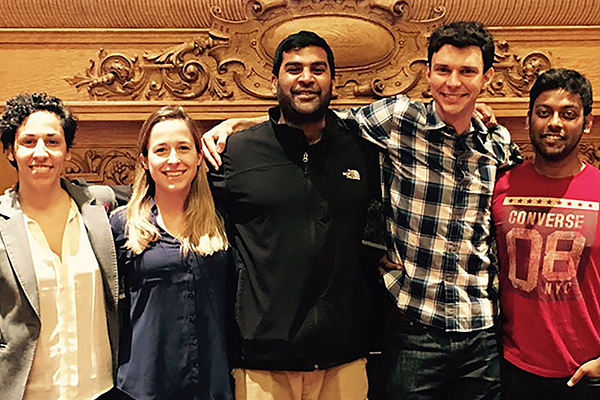Pictured from left: Nitsan Shakked, Stephanie Leutert, Shashank Iyer, Tiago SanFelice and Anudeep Yegireddi
Five Yale graduate students were selected for a $20,000 grant from D-Prize, a social venture competition targeting poverty problems, for their innovative proposal to increase adherence to malaria medication in Sierra Leone. The nonprofit organization, called TextDirect, will pilot an automated, web-based platform that sends personalized text message reminders to patients undergoing malaria treatment.
In Sierra Leone, malaria is a major public health concern, accounting for nearly 50 percent of outpatient visits, and is a significant cause of child mortality. While ACT-drug treatment regimes are subsidized and very effective, patients often fail to complete the full prescribed course of treatment. Similar to antibiotics, these drugs often make patients feel better after just a few doses, but the infection can return if the regime is not completed.
The Yale students are Stephanie Leutert, Tiago SanFelice and Nitsan Shakked, all second-year MA students at Yale’s Jackson Institute for Global Affairs; Anudeep Yegireddi, an MBA student at the Yale School of Management (SOM); and Shashank Iyer, a joint-degree student at SOM and Jackson.
The project first started as part of a class assignment. The professor liked the idea for TextDirect and encouraged the students to apply for D-Prize. “It became something much larger than the class,” said SanFelice. “It’s a small idea with a big contribution.”
D-Prize is dedicated toward expanding access to poverty-alleviation solutions in the developing world. Many solutions to poverty already exist; the challenge is distributing these solutions to the people who need it most.
Part of what attracted the students to this particular idea was the volume of data showing how effective text messages can be in encouraging adherence to medication. It worked very effectively during the Ebola epidemic, but hadn’t been scaled up.
“It’s very exciting – technology doesn’t need to be super complicated” to have an impact, SanFelice said.
Iyer, who worked in development before beginning his studies at Yale, says he has seen some programs fail because they were not grounded in solid data. That’s what makes this project so exciting for him. “It is a chance to demonstrate that data-driven development can be effective in creating change,” he said.
“As someone who had malaria twice while living in Uganda, I’m well aware of how debilitating of a disease it can be,” said Leutert. “The use of text reminders will help ensure that malaria patients complete their full medication dosage, not just increasing their own health and quality of living but also reducing the spread of this disease across their communities.”
The grant money will go toward developing the IT infrastructure and covering the cost of text messages, plus incentives for doctors and nurses who will do the data entry to get patients registered for the program. In Sierra Leone, about 80 percent of adults have access to a basic mobile phone. The pilot group will consist of 2,500 patients.
Iyer will be on the ground beginning this summer. He secured an internship with the Ministry of Finance and Economic Development of Sierra Leone before learning that TextDirect was selected for D-Prize. One of his goals for the summer is to build relationships with hospitals and clinics, as well as with more established NGOs and foundations doing similar work in country.
Iyer and his classmates hope to raise additional funds for the project and help it become sustainable over time, eventually hiring paid staff on the ground and handing over ownership to local communities.
